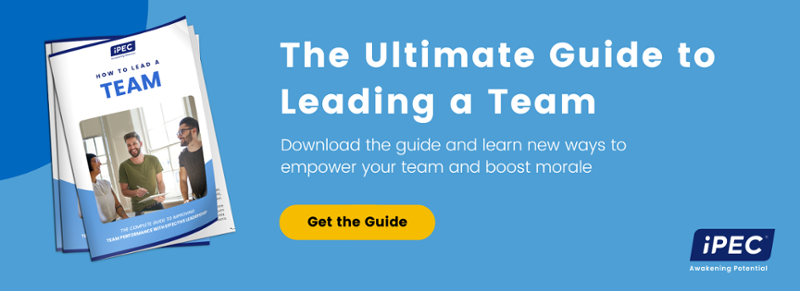How to Be More Confident at Work: 6 Helpful Strategies
by iPEC Team
Mar 25, 2022 | 4 minutes read
Confidence is an essential quality in the modern workplace. It can have a substantial impact on your ability to voice your ideas, and play an empowered role in your career trajectory and professional development.
It’s also important to remember that a lack of confidence is not an inherent flaw. In fact, it’s totally understandable! Many people are prone to second-guessing themselves and keeping quiet—especially among large groups, when talking to leadership, when starting in a new role, or joining a new organization. Even those with years of experience can experience a lack of confidence at work.
Thankfully, there are many approachable strategies to help you feel more confident at work. While this process can take time, incorporating these actions and sticking with them can build your confidence muscle into a lasting, powerful strength.
Here are six actions you can take to begin building and maintaining confidence in the workplace.
Identify what strengths you bring to the table
We all have something valuable to share, and the first step in believing that is to take time to identify what makes you special! Maybe you’re a gifted artist, or adept at working with numbers. Maybe you’re multilingual, or a devoted parent. Remember to think in terms of both strengths and qualities, and not to undervalue things like empathy, collaboration, and intuition.
Whatever your unique qualities may be, they all contribute to what makes you a valuable and worthwhile voice among your colleagues. In taking time to identify these qualities, you may even uncover specific areas for which you’re more highly qualified than you originally thought—making you a perfect contributor to a new universe of discussions!
Start small with new opportunities to stretch yourself
Being confident isn’t about being aggressive or about becoming an entirely new person—it’s about asserting yourself in ways that feel fulfilling to you. So to begin, start finding new opportunities to express yourself that might stretch you, without feeling too scary.
This could be as simple as turning on your camera during video calls, or making small talk with colleagues during the day, before and after meetings. Simple steps like these can help you feel more confident in the workplace overall, which can help you feel more comfortable and capable of voicing your opinions and lending your expertise.
Develop new knowledge and skills
So often when we feel a lack of confidence in the workplace, it stems from a fear that we might not know what we’re talking about—or worse!—that we might end up sounding inept. In fact, many people miss an opportunity to speak up when they might have something incredibly valuable to contribute, just because they’re afraid they might get something wrong.
While much of this usually comes from a deeper place of self-doubt, it’s also true that gaining new skills and knowledge can be a great and effective way to build confidence. This could look like more ‘traditional’ forms of learning, like reading books or taking courses—or, it could be as simple as asking more questions and deepening your understanding through curiosity. Either way, you’re learning!
The more we know about a topic or a discipline, the more naturally confident we’ll be in speaking up and contributing to conversations about it. It can also help move you outside your comfort zone and cultivate confidence in entirely new areas. (And as an added bonus, not only does this build confidence, it can also help poise you for promotion or advancement as you continue to build your resume and hone your craft!)
Pay attention to confident peers, and get curious
Another great way to build confidence is to identify a handful of peers or leaders you admire, and pay attention to what specifically about them or their behavior conveys confidence to you. Once you’ve honed in on some specifics about how their confidence manifests, get curious about those details and how you might make them your own! You might consider questions like:
- What is it about their actions and/or their way of being that conveys ‘confidence’ to me?
- What can I learn from these observations?
- How true is it that I'm lacking those qualities myself?
- Is there an opportunity to ask them some deeper questions about where their confidence comes from?
- How could I challenge myself to start building some of those qualities I admire?
Having confident people in your midst who you admire is a great thing—there’s a lot you can learn from them. And rather than simply trying to emulate their behavior, see if you can allow any admiration you feel to prompt you to turn inward and get curious about how you might learn from those feelings of inspiration, while putting your own stamp on them too.
Notice (and even challenge!) your thoughts
Much of how we feel starts with what we think, and confidence is no exception. When you notice that your confidence feels shaky in a particular situation in the workplace, pay close attention to the thoughts that are running through your mind. Is there a story you’re telling yourself about yourself and/or the situation that’s contributing to your self-doubt? What beliefs or interpretations are causing you to feel unsure of yourself?
Of course, having those types of thoughts is completely normal and understandable! And it can be really powerful to challenge them by asking yourself things like:
- How true is that story?
- Would I say that to someone I care about?
- What’s another way of viewing or interpreting this situation?
This may feel challenging at first, especially since many of us are used to thinking in black-and-white-terms, and believing every thought we have. But over time, you can start to rewrite some of those stories and beliefs about yourself in a way that helps them lose their charge, and allows you to gradually build your confidence.
Become a Certified Professional Coach (CPC)
While there are many ways to focus on and practice confident behaviors, becoming a Certified Professional Coach is one of the most effective and actionable ways to become an agent of change within your role and at your workplace. Regardless of your role or your level of seniority, you have the power to affect meaningful change through formalized coach training—and iPEC is here to help you get there.
In becoming a Certified Professional Coach (CPC), you’ll be able to help both yourself and others become the most confident, self-reliant, and fulfilled version of themselves. Research also shows that HR professionals who became an iPEC Certified Professional Coach were promoted 14% more often than colleagues with no certifications, in addition to taking home 28% more pay.
Through expert training and support in mastering Core Energy Coaching™, you will open limitless opportunities for career growth and fulfillment—both in your own life and in the lives of those you work with every day.
Get the free guide to How to Lead a Team, and discover new ways to empower your team and boost morale.


